Entrepreneurship Report: Traits, Motivation, and Background Analysis
VerifiedAdded on 2021/02/21
|8
|2239
|29
Report
AI Summary
This report provides a comprehensive overview of entrepreneurship and small business management, focusing on the characteristics, traits, and skills of successful entrepreneurs. It analyzes the entrepreneurial motivation and mindset, including the influence of personality traits as described by the OCEAN model. The report uses examples of successful UK entrepreneurs like Duncan Bannatyne and J.K. Rowling to illustrate key concepts. It examines how their backgrounds and experiences fostered their entrepreneurship. The report also highlights the differences between entrepreneurs and managers and concludes by emphasizing the role of small and medium enterprises in economic development. The report draws upon academic journals and online resources to support its findings.

Entrepreneurship and
Small Business
Management
Small Business
Management
Paraphrase This Document
Need a fresh take? Get an instant paraphrase of this document with our AI Paraphraser
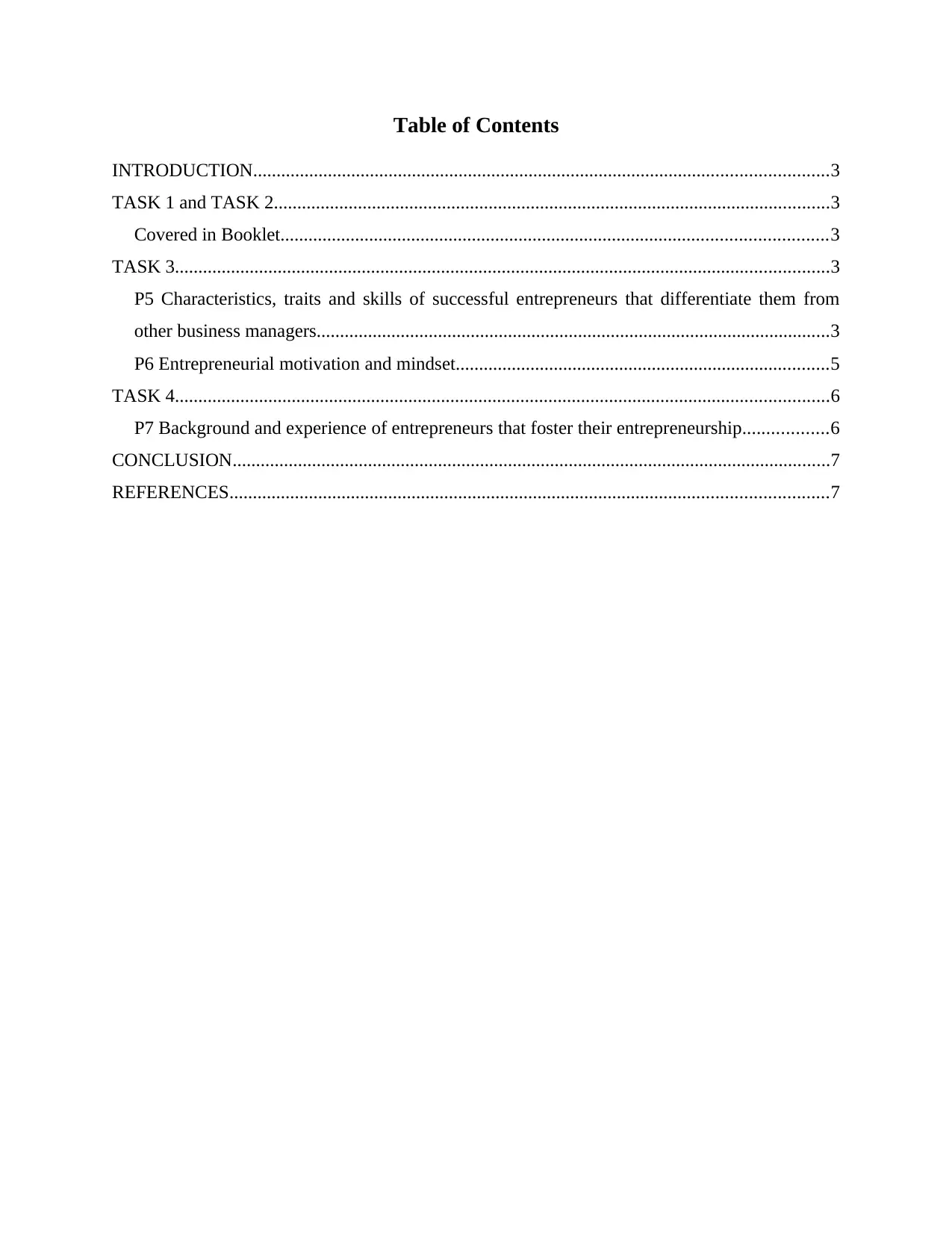
Table of Contents
INTRODUCTION...........................................................................................................................3
TASK 1 and TASK 2.......................................................................................................................3
Covered in Booklet.....................................................................................................................3
TASK 3............................................................................................................................................3
P5 Characteristics, traits and skills of successful entrepreneurs that differentiate them from
other business managers..............................................................................................................3
P6 Entrepreneurial motivation and mindset................................................................................5
TASK 4............................................................................................................................................6
P7 Background and experience of entrepreneurs that foster their entrepreneurship..................6
CONCLUSION................................................................................................................................7
REFERENCES................................................................................................................................7
INTRODUCTION...........................................................................................................................3
TASK 1 and TASK 2.......................................................................................................................3
Covered in Booklet.....................................................................................................................3
TASK 3............................................................................................................................................3
P5 Characteristics, traits and skills of successful entrepreneurs that differentiate them from
other business managers..............................................................................................................3
P6 Entrepreneurial motivation and mindset................................................................................5
TASK 4............................................................................................................................................6
P7 Background and experience of entrepreneurs that foster their entrepreneurship..................6
CONCLUSION................................................................................................................................7
REFERENCES................................................................................................................................7
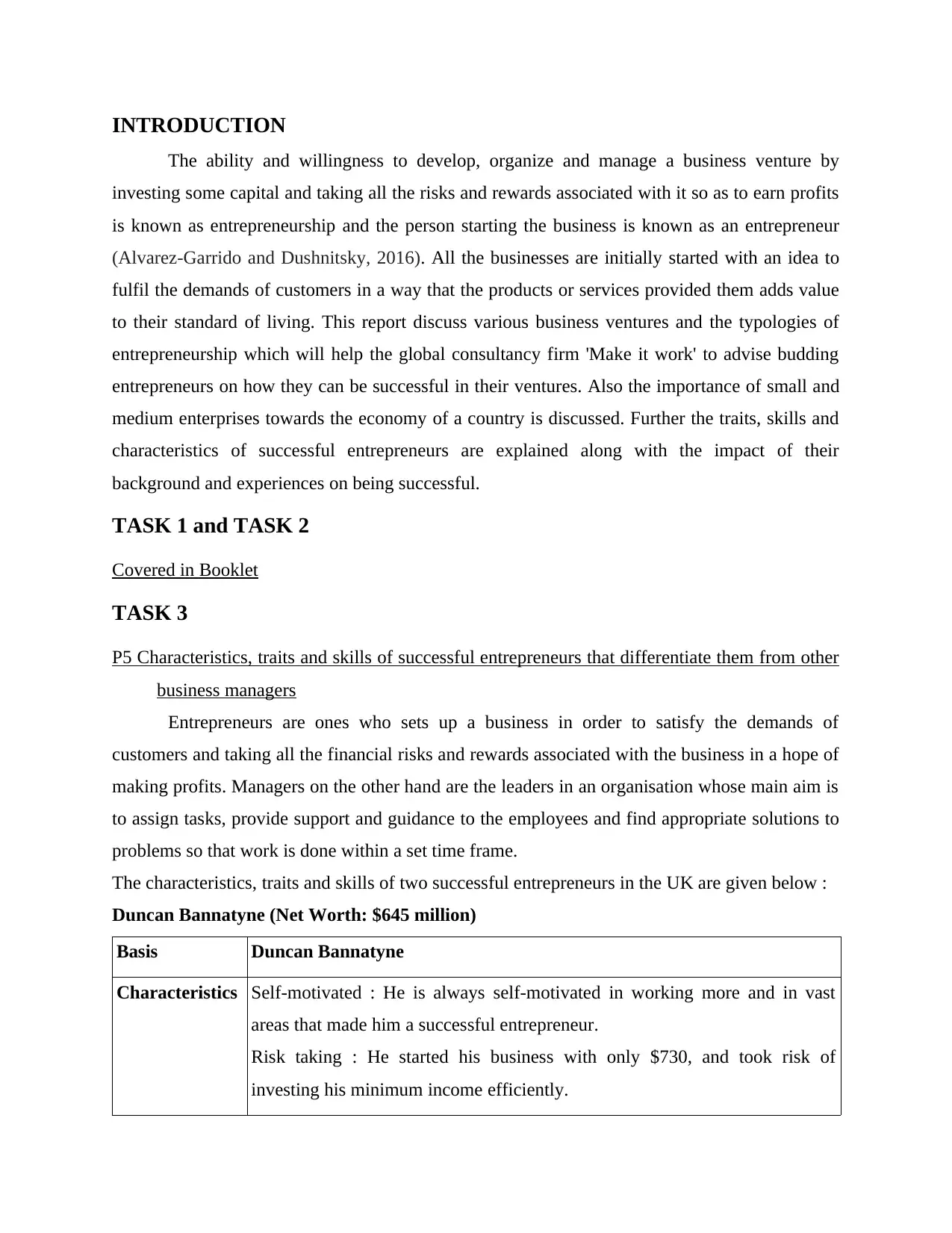
INTRODUCTION
The ability and willingness to develop, organize and manage a business venture by
investing some capital and taking all the risks and rewards associated with it so as to earn profits
is known as entrepreneurship and the person starting the business is known as an entrepreneur
(Alvarez‐Garrido and Dushnitsky, 2016). All the businesses are initially started with an idea to
fulfil the demands of customers in a way that the products or services provided them adds value
to their standard of living. This report discuss various business ventures and the typologies of
entrepreneurship which will help the global consultancy firm 'Make it work' to advise budding
entrepreneurs on how they can be successful in their ventures. Also the importance of small and
medium enterprises towards the economy of a country is discussed. Further the traits, skills and
characteristics of successful entrepreneurs are explained along with the impact of their
background and experiences on being successful.
TASK 1 and TASK 2
Covered in Booklet
TASK 3
P5 Characteristics, traits and skills of successful entrepreneurs that differentiate them from other
business managers
Entrepreneurs are ones who sets up a business in order to satisfy the demands of
customers and taking all the financial risks and rewards associated with the business in a hope of
making profits. Managers on the other hand are the leaders in an organisation whose main aim is
to assign tasks, provide support and guidance to the employees and find appropriate solutions to
problems so that work is done within a set time frame.
The characteristics, traits and skills of two successful entrepreneurs in the UK are given below :
Duncan Bannatyne (Net Worth: $645 million)
Basis Duncan Bannatyne
Characteristics Self-motivated : He is always self-motivated in working more and in vast
areas that made him a successful entrepreneur.
Risk taking : He started his business with only $730, and took risk of
investing his minimum income efficiently.
The ability and willingness to develop, organize and manage a business venture by
investing some capital and taking all the risks and rewards associated with it so as to earn profits
is known as entrepreneurship and the person starting the business is known as an entrepreneur
(Alvarez‐Garrido and Dushnitsky, 2016). All the businesses are initially started with an idea to
fulfil the demands of customers in a way that the products or services provided them adds value
to their standard of living. This report discuss various business ventures and the typologies of
entrepreneurship which will help the global consultancy firm 'Make it work' to advise budding
entrepreneurs on how they can be successful in their ventures. Also the importance of small and
medium enterprises towards the economy of a country is discussed. Further the traits, skills and
characteristics of successful entrepreneurs are explained along with the impact of their
background and experiences on being successful.
TASK 1 and TASK 2
Covered in Booklet
TASK 3
P5 Characteristics, traits and skills of successful entrepreneurs that differentiate them from other
business managers
Entrepreneurs are ones who sets up a business in order to satisfy the demands of
customers and taking all the financial risks and rewards associated with the business in a hope of
making profits. Managers on the other hand are the leaders in an organisation whose main aim is
to assign tasks, provide support and guidance to the employees and find appropriate solutions to
problems so that work is done within a set time frame.
The characteristics, traits and skills of two successful entrepreneurs in the UK are given below :
Duncan Bannatyne (Net Worth: $645 million)
Basis Duncan Bannatyne
Characteristics Self-motivated : He is always self-motivated in working more and in vast
areas that made him a successful entrepreneur.
Risk taking : He started his business with only $730, and took risk of
investing his minimum income efficiently.
⊘ This is a preview!⊘
Do you want full access?
Subscribe today to unlock all pages.

Trusted by 1+ million students worldwide
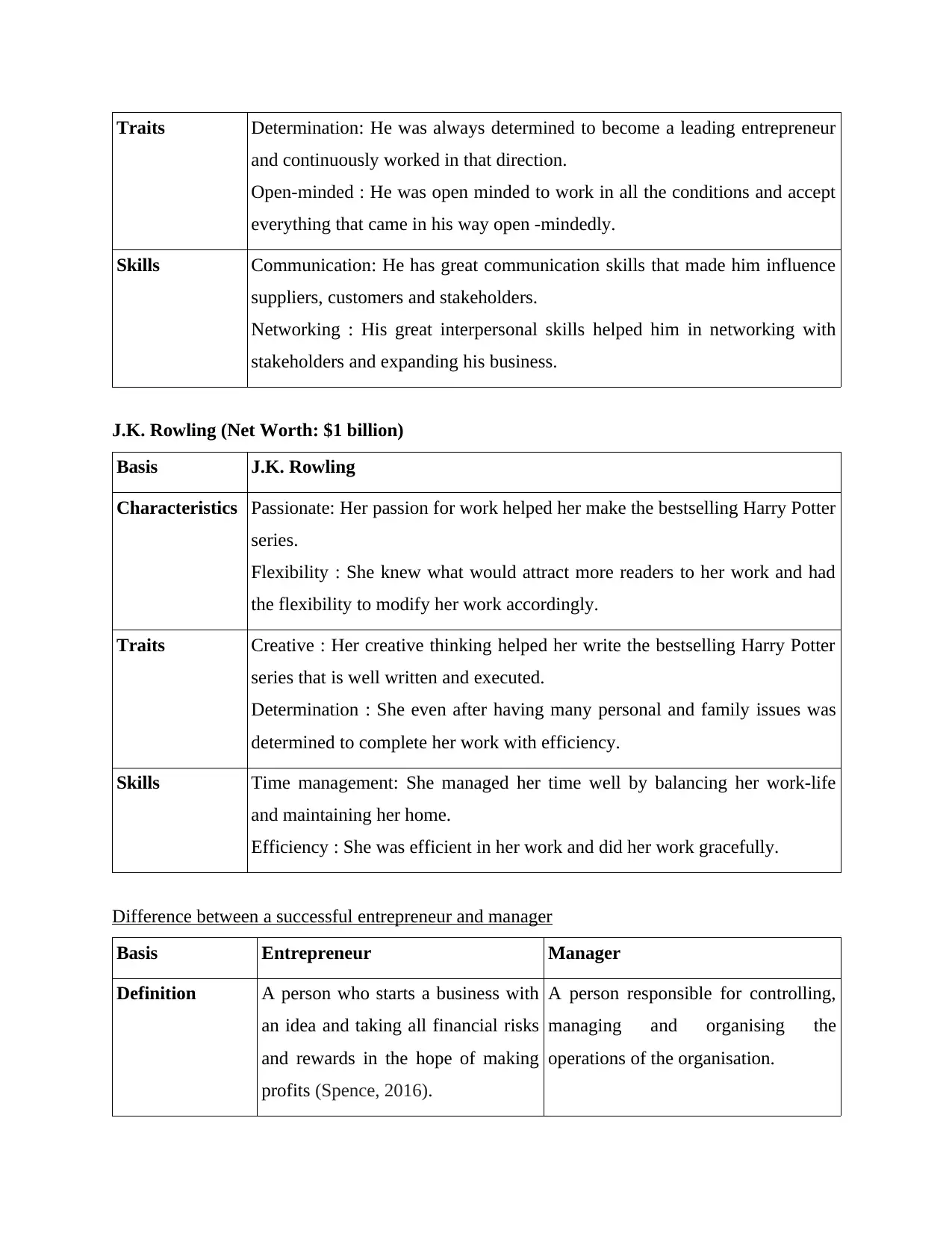
Traits Determination: He was always determined to become a leading entrepreneur
and continuously worked in that direction.
Open-minded : He was open minded to work in all the conditions and accept
everything that came in his way open -mindedly.
Skills Communication: He has great communication skills that made him influence
suppliers, customers and stakeholders.
Networking : His great interpersonal skills helped him in networking with
stakeholders and expanding his business.
J.K. Rowling (Net Worth: $1 billion)
Basis J.K. Rowling
Characteristics Passionate: Her passion for work helped her make the bestselling Harry Potter
series.
Flexibility : She knew what would attract more readers to her work and had
the flexibility to modify her work accordingly.
Traits Creative : Her creative thinking helped her write the bestselling Harry Potter
series that is well written and executed.
Determination : She even after having many personal and family issues was
determined to complete her work with efficiency.
Skills Time management: She managed her time well by balancing her work-life
and maintaining her home.
Efficiency : She was efficient in her work and did her work gracefully.
Difference between a successful entrepreneur and manager
Basis Entrepreneur Manager
Definition A person who starts a business with
an idea and taking all financial risks
and rewards in the hope of making
profits (Spence, 2016).
A person responsible for controlling,
managing and organising the
operations of the organisation.
and continuously worked in that direction.
Open-minded : He was open minded to work in all the conditions and accept
everything that came in his way open -mindedly.
Skills Communication: He has great communication skills that made him influence
suppliers, customers and stakeholders.
Networking : His great interpersonal skills helped him in networking with
stakeholders and expanding his business.
J.K. Rowling (Net Worth: $1 billion)
Basis J.K. Rowling
Characteristics Passionate: Her passion for work helped her make the bestselling Harry Potter
series.
Flexibility : She knew what would attract more readers to her work and had
the flexibility to modify her work accordingly.
Traits Creative : Her creative thinking helped her write the bestselling Harry Potter
series that is well written and executed.
Determination : She even after having many personal and family issues was
determined to complete her work with efficiency.
Skills Time management: She managed her time well by balancing her work-life
and maintaining her home.
Efficiency : She was efficient in her work and did her work gracefully.
Difference between a successful entrepreneur and manager
Basis Entrepreneur Manager
Definition A person who starts a business with
an idea and taking all financial risks
and rewards in the hope of making
profits (Spence, 2016).
A person responsible for controlling,
managing and organising the
operations of the organisation.
Paraphrase This Document
Need a fresh take? Get an instant paraphrase of this document with our AI Paraphraser
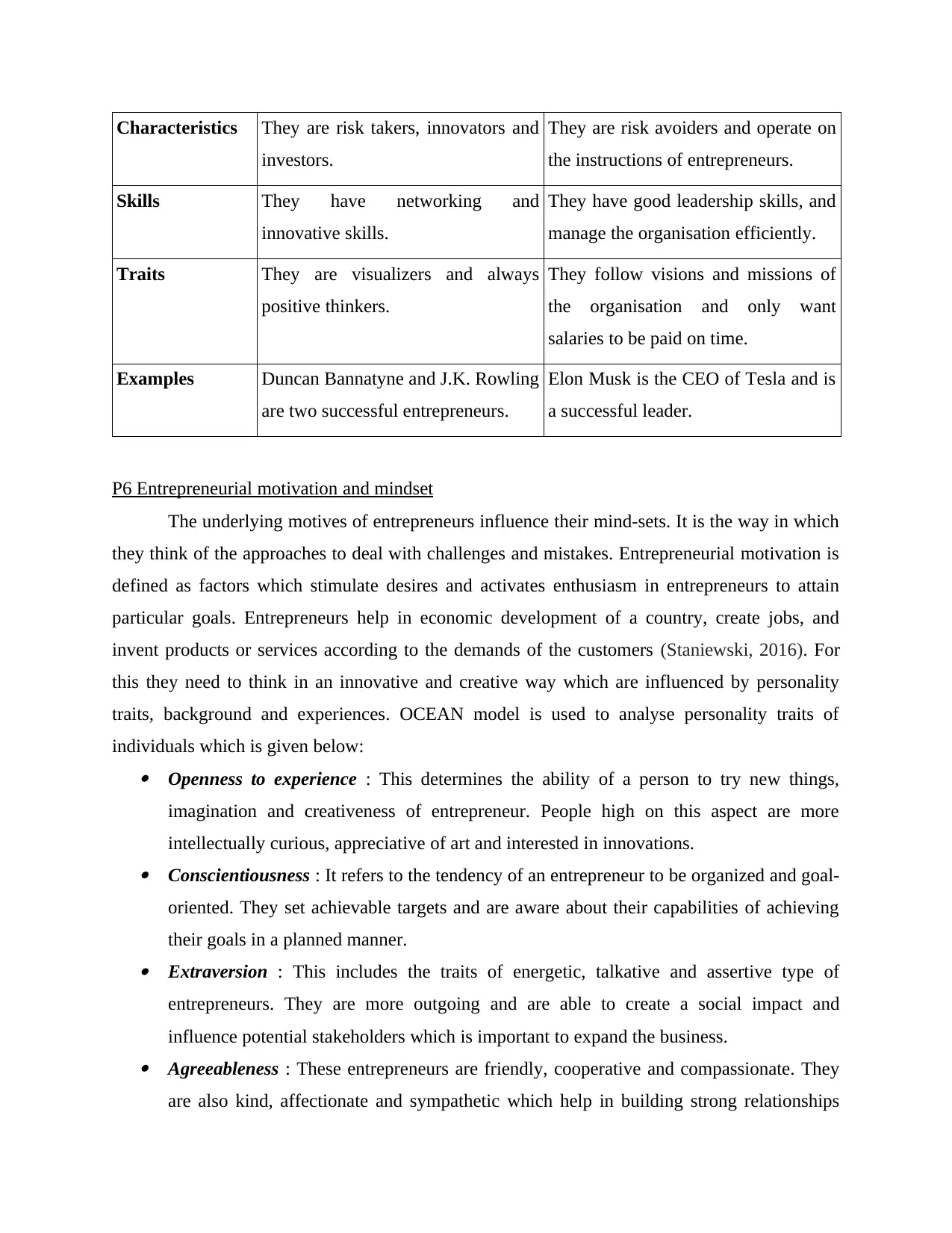
Characteristics They are risk takers, innovators and
investors.
They are risk avoiders and operate on
the instructions of entrepreneurs.
Skills They have networking and
innovative skills.
They have good leadership skills, and
manage the organisation efficiently.
Traits They are visualizers and always
positive thinkers.
They follow visions and missions of
the organisation and only want
salaries to be paid on time.
Examples Duncan Bannatyne and J.K. Rowling
are two successful entrepreneurs.
Elon Musk is the CEO of Tesla and is
a successful leader.
P6 Entrepreneurial motivation and mindset
The underlying motives of entrepreneurs influence their mind-sets. It is the way in which
they think of the approaches to deal with challenges and mistakes. Entrepreneurial motivation is
defined as factors which stimulate desires and activates enthusiasm in entrepreneurs to attain
particular goals. Entrepreneurs help in economic development of a country, create jobs, and
invent products or services according to the demands of the customers (Staniewski, 2016). For
this they need to think in an innovative and creative way which are influenced by personality
traits, background and experiences. OCEAN model is used to analyse personality traits of
individuals which is given below: Openness to experience : This determines the ability of a person to try new things,
imagination and creativeness of entrepreneur. People high on this aspect are more
intellectually curious, appreciative of art and interested in innovations. Conscientiousness : It refers to the tendency of an entrepreneur to be organized and goal-
oriented. They set achievable targets and are aware about their capabilities of achieving
their goals in a planned manner. Extraversion : This includes the traits of energetic, talkative and assertive type of
entrepreneurs. They are more outgoing and are able to create a social impact and
influence potential stakeholders which is important to expand the business. Agreeableness : These entrepreneurs are friendly, cooperative and compassionate. They
are also kind, affectionate and sympathetic which help in building strong relationships
investors.
They are risk avoiders and operate on
the instructions of entrepreneurs.
Skills They have networking and
innovative skills.
They have good leadership skills, and
manage the organisation efficiently.
Traits They are visualizers and always
positive thinkers.
They follow visions and missions of
the organisation and only want
salaries to be paid on time.
Examples Duncan Bannatyne and J.K. Rowling
are two successful entrepreneurs.
Elon Musk is the CEO of Tesla and is
a successful leader.
P6 Entrepreneurial motivation and mindset
The underlying motives of entrepreneurs influence their mind-sets. It is the way in which
they think of the approaches to deal with challenges and mistakes. Entrepreneurial motivation is
defined as factors which stimulate desires and activates enthusiasm in entrepreneurs to attain
particular goals. Entrepreneurs help in economic development of a country, create jobs, and
invent products or services according to the demands of the customers (Staniewski, 2016). For
this they need to think in an innovative and creative way which are influenced by personality
traits, background and experiences. OCEAN model is used to analyse personality traits of
individuals which is given below: Openness to experience : This determines the ability of a person to try new things,
imagination and creativeness of entrepreneur. People high on this aspect are more
intellectually curious, appreciative of art and interested in innovations. Conscientiousness : It refers to the tendency of an entrepreneur to be organized and goal-
oriented. They set achievable targets and are aware about their capabilities of achieving
their goals in a planned manner. Extraversion : This includes the traits of energetic, talkative and assertive type of
entrepreneurs. They are more outgoing and are able to create a social impact and
influence potential stakeholders which is important to expand the business. Agreeableness : These entrepreneurs are friendly, cooperative and compassionate. They
are also kind, affectionate and sympathetic which help in building strong relationships
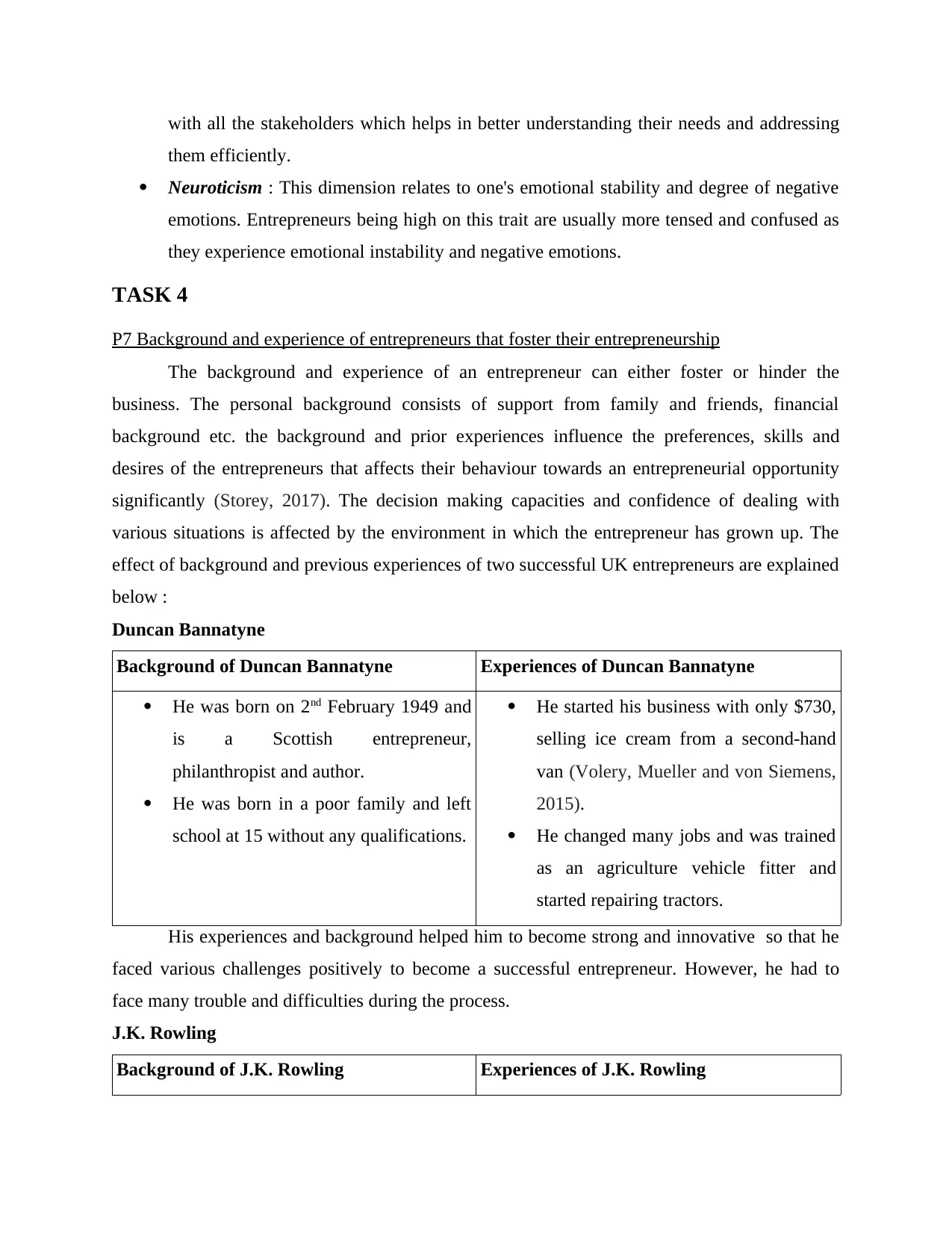
with all the stakeholders which helps in better understanding their needs and addressing
them efficiently.
Neuroticism : This dimension relates to one's emotional stability and degree of negative
emotions. Entrepreneurs being high on this trait are usually more tensed and confused as
they experience emotional instability and negative emotions.
TASK 4
P7 Background and experience of entrepreneurs that foster their entrepreneurship
The background and experience of an entrepreneur can either foster or hinder the
business. The personal background consists of support from family and friends, financial
background etc. the background and prior experiences influence the preferences, skills and
desires of the entrepreneurs that affects their behaviour towards an entrepreneurial opportunity
significantly (Storey, 2017). The decision making capacities and confidence of dealing with
various situations is affected by the environment in which the entrepreneur has grown up. The
effect of background and previous experiences of two successful UK entrepreneurs are explained
below :
Duncan Bannatyne
Background of Duncan Bannatyne Experiences of Duncan Bannatyne
He was born on 2nd February 1949 and
is a Scottish entrepreneur,
philanthropist and author.
He was born in a poor family and left
school at 15 without any qualifications.
He started his business with only $730,
selling ice cream from a second-hand
van (Volery, Mueller and von Siemens,
2015).
He changed many jobs and was trained
as an agriculture vehicle fitter and
started repairing tractors.
His experiences and background helped him to become strong and innovative so that he
faced various challenges positively to become a successful entrepreneur. However, he had to
face many trouble and difficulties during the process.
J.K. Rowling
Background of J.K. Rowling Experiences of J.K. Rowling
them efficiently.
Neuroticism : This dimension relates to one's emotional stability and degree of negative
emotions. Entrepreneurs being high on this trait are usually more tensed and confused as
they experience emotional instability and negative emotions.
TASK 4
P7 Background and experience of entrepreneurs that foster their entrepreneurship
The background and experience of an entrepreneur can either foster or hinder the
business. The personal background consists of support from family and friends, financial
background etc. the background and prior experiences influence the preferences, skills and
desires of the entrepreneurs that affects their behaviour towards an entrepreneurial opportunity
significantly (Storey, 2017). The decision making capacities and confidence of dealing with
various situations is affected by the environment in which the entrepreneur has grown up. The
effect of background and previous experiences of two successful UK entrepreneurs are explained
below :
Duncan Bannatyne
Background of Duncan Bannatyne Experiences of Duncan Bannatyne
He was born on 2nd February 1949 and
is a Scottish entrepreneur,
philanthropist and author.
He was born in a poor family and left
school at 15 without any qualifications.
He started his business with only $730,
selling ice cream from a second-hand
van (Volery, Mueller and von Siemens,
2015).
He changed many jobs and was trained
as an agriculture vehicle fitter and
started repairing tractors.
His experiences and background helped him to become strong and innovative so that he
faced various challenges positively to become a successful entrepreneur. However, he had to
face many trouble and difficulties during the process.
J.K. Rowling
Background of J.K. Rowling Experiences of J.K. Rowling
⊘ This is a preview!⊘
Do you want full access?
Subscribe today to unlock all pages.

Trusted by 1+ million students worldwide
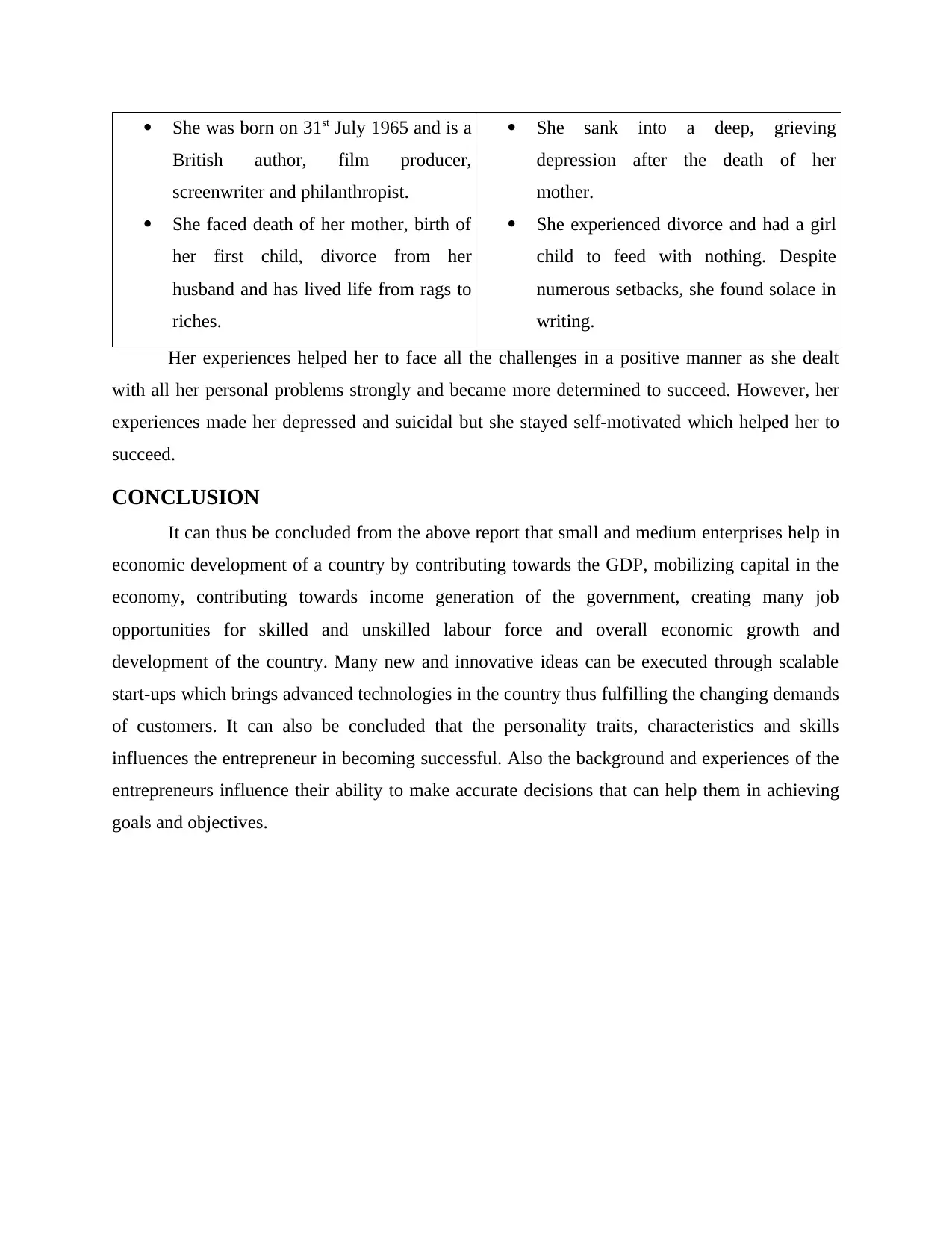
She was born on 31st July 1965 and is a
British author, film producer,
screenwriter and philanthropist.
She faced death of her mother, birth of
her first child, divorce from her
husband and has lived life from rags to
riches.
She sank into a deep, grieving
depression after the death of her
mother.
She experienced divorce and had a girl
child to feed with nothing. Despite
numerous setbacks, she found solace in
writing.
Her experiences helped her to face all the challenges in a positive manner as she dealt
with all her personal problems strongly and became more determined to succeed. However, her
experiences made her depressed and suicidal but she stayed self-motivated which helped her to
succeed.
CONCLUSION
It can thus be concluded from the above report that small and medium enterprises help in
economic development of a country by contributing towards the GDP, mobilizing capital in the
economy, contributing towards income generation of the government, creating many job
opportunities for skilled and unskilled labour force and overall economic growth and
development of the country. Many new and innovative ideas can be executed through scalable
start-ups which brings advanced technologies in the country thus fulfilling the changing demands
of customers. It can also be concluded that the personality traits, characteristics and skills
influences the entrepreneur in becoming successful. Also the background and experiences of the
entrepreneurs influence their ability to make accurate decisions that can help them in achieving
goals and objectives.
British author, film producer,
screenwriter and philanthropist.
She faced death of her mother, birth of
her first child, divorce from her
husband and has lived life from rags to
riches.
She sank into a deep, grieving
depression after the death of her
mother.
She experienced divorce and had a girl
child to feed with nothing. Despite
numerous setbacks, she found solace in
writing.
Her experiences helped her to face all the challenges in a positive manner as she dealt
with all her personal problems strongly and became more determined to succeed. However, her
experiences made her depressed and suicidal but she stayed self-motivated which helped her to
succeed.
CONCLUSION
It can thus be concluded from the above report that small and medium enterprises help in
economic development of a country by contributing towards the GDP, mobilizing capital in the
economy, contributing towards income generation of the government, creating many job
opportunities for skilled and unskilled labour force and overall economic growth and
development of the country. Many new and innovative ideas can be executed through scalable
start-ups which brings advanced technologies in the country thus fulfilling the changing demands
of customers. It can also be concluded that the personality traits, characteristics and skills
influences the entrepreneur in becoming successful. Also the background and experiences of the
entrepreneurs influence their ability to make accurate decisions that can help them in achieving
goals and objectives.
Paraphrase This Document
Need a fresh take? Get an instant paraphrase of this document with our AI Paraphraser
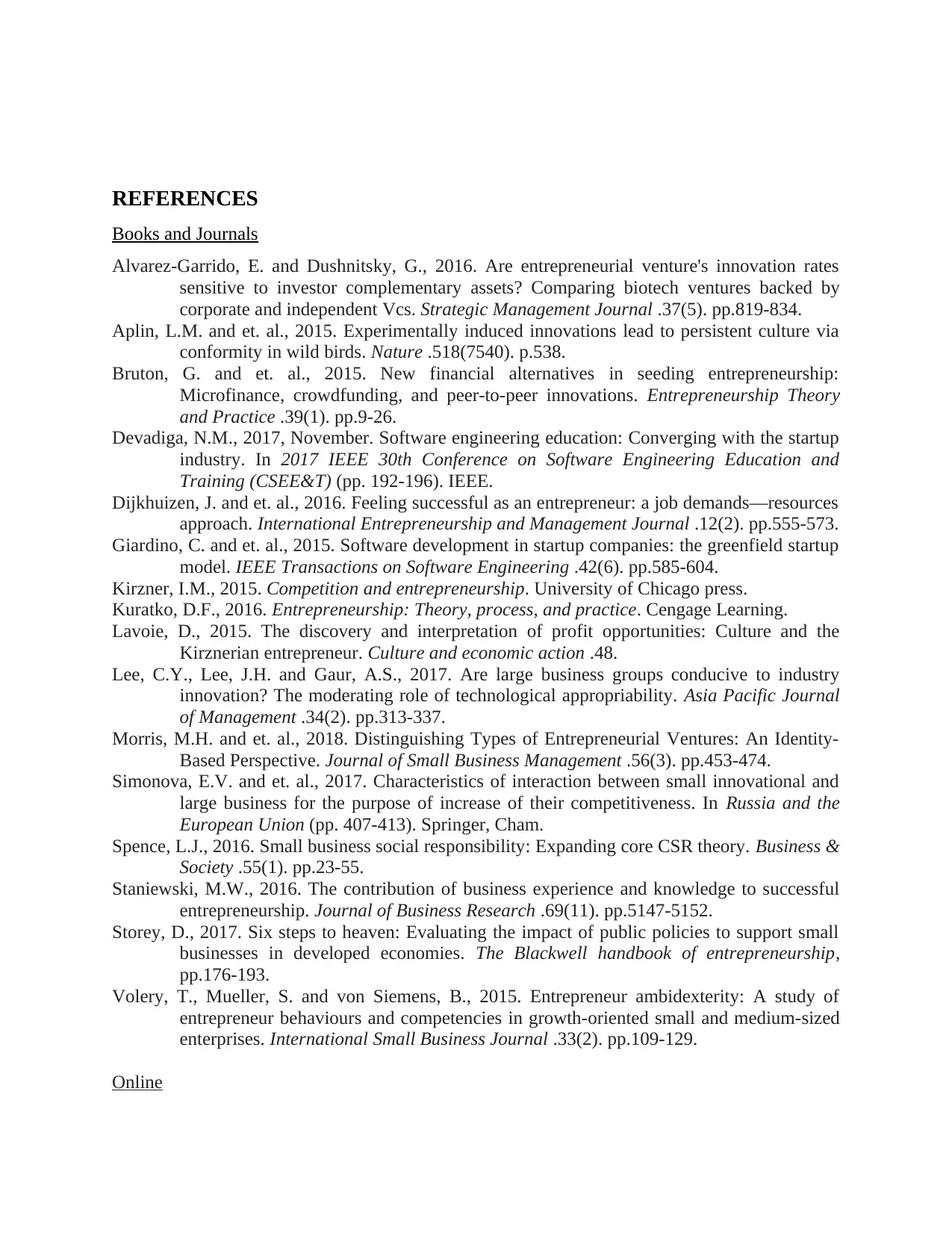
REFERENCES
Books and Journals
Alvarez‐Garrido, E. and Dushnitsky, G., 2016. Are entrepreneurial venture's innovation rates
sensitive to investor complementary assets? Comparing biotech ventures backed by
corporate and independent Vcs. Strategic Management Journal .37(5). pp.819-834.
Aplin, L.M. and et. al., 2015. Experimentally induced innovations lead to persistent culture via
conformity in wild birds. Nature .518(7540). p.538.
Bruton, G. and et. al., 2015. New financial alternatives in seeding entrepreneurship:
Microfinance, crowdfunding, and peer‐to‐peer innovations. Entrepreneurship Theory
and Practice .39(1). pp.9-26.
Devadiga, N.M., 2017, November. Software engineering education: Converging with the startup
industry. In 2017 IEEE 30th Conference on Software Engineering Education and
Training (CSEE&T) (pp. 192-196). IEEE.
Dijkhuizen, J. and et. al., 2016. Feeling successful as an entrepreneur: a job demands—resources
approach. International Entrepreneurship and Management Journal .12(2). pp.555-573.
Giardino, C. and et. al., 2015. Software development in startup companies: the greenfield startup
model. IEEE Transactions on Software Engineering .42(6). pp.585-604.
Kirzner, I.M., 2015. Competition and entrepreneurship. University of Chicago press.
Kuratko, D.F., 2016. Entrepreneurship: Theory, process, and practice. Cengage Learning.
Lavoie, D., 2015. The discovery and interpretation of profit opportunities: Culture and the
Kirznerian entrepreneur. Culture and economic action .48.
Lee, C.Y., Lee, J.H. and Gaur, A.S., 2017. Are large business groups conducive to industry
innovation? The moderating role of technological appropriability. Asia Pacific Journal
of Management .34(2). pp.313-337.
Morris, M.H. and et. al., 2018. Distinguishing Types of Entrepreneurial Ventures: An Identity‐
Based Perspective. Journal of Small Business Management .56(3). pp.453-474.
Simonova, E.V. and et. al., 2017. Characteristics of interaction between small innovational and
large business for the purpose of increase of their competitiveness. In Russia and the
European Union (pp. 407-413). Springer, Cham.
Spence, L.J., 2016. Small business social responsibility: Expanding core CSR theory. Business &
Society .55(1). pp.23-55.
Staniewski, M.W., 2016. The contribution of business experience and knowledge to successful
entrepreneurship. Journal of Business Research .69(11). pp.5147-5152.
Storey, D., 2017. Six steps to heaven: Evaluating the impact of public policies to support small
businesses in developed economies. The Blackwell handbook of entrepreneurship,
pp.176-193.
Volery, T., Mueller, S. and von Siemens, B., 2015. Entrepreneur ambidexterity: A study of
entrepreneur behaviours and competencies in growth-oriented small and medium-sized
enterprises. International Small Business Journal .33(2). pp.109-129.
Online
Books and Journals
Alvarez‐Garrido, E. and Dushnitsky, G., 2016. Are entrepreneurial venture's innovation rates
sensitive to investor complementary assets? Comparing biotech ventures backed by
corporate and independent Vcs. Strategic Management Journal .37(5). pp.819-834.
Aplin, L.M. and et. al., 2015. Experimentally induced innovations lead to persistent culture via
conformity in wild birds. Nature .518(7540). p.538.
Bruton, G. and et. al., 2015. New financial alternatives in seeding entrepreneurship:
Microfinance, crowdfunding, and peer‐to‐peer innovations. Entrepreneurship Theory
and Practice .39(1). pp.9-26.
Devadiga, N.M., 2017, November. Software engineering education: Converging with the startup
industry. In 2017 IEEE 30th Conference on Software Engineering Education and
Training (CSEE&T) (pp. 192-196). IEEE.
Dijkhuizen, J. and et. al., 2016. Feeling successful as an entrepreneur: a job demands—resources
approach. International Entrepreneurship and Management Journal .12(2). pp.555-573.
Giardino, C. and et. al., 2015. Software development in startup companies: the greenfield startup
model. IEEE Transactions on Software Engineering .42(6). pp.585-604.
Kirzner, I.M., 2015. Competition and entrepreneurship. University of Chicago press.
Kuratko, D.F., 2016. Entrepreneurship: Theory, process, and practice. Cengage Learning.
Lavoie, D., 2015. The discovery and interpretation of profit opportunities: Culture and the
Kirznerian entrepreneur. Culture and economic action .48.
Lee, C.Y., Lee, J.H. and Gaur, A.S., 2017. Are large business groups conducive to industry
innovation? The moderating role of technological appropriability. Asia Pacific Journal
of Management .34(2). pp.313-337.
Morris, M.H. and et. al., 2018. Distinguishing Types of Entrepreneurial Ventures: An Identity‐
Based Perspective. Journal of Small Business Management .56(3). pp.453-474.
Simonova, E.V. and et. al., 2017. Characteristics of interaction between small innovational and
large business for the purpose of increase of their competitiveness. In Russia and the
European Union (pp. 407-413). Springer, Cham.
Spence, L.J., 2016. Small business social responsibility: Expanding core CSR theory. Business &
Society .55(1). pp.23-55.
Staniewski, M.W., 2016. The contribution of business experience and knowledge to successful
entrepreneurship. Journal of Business Research .69(11). pp.5147-5152.
Storey, D., 2017. Six steps to heaven: Evaluating the impact of public policies to support small
businesses in developed economies. The Blackwell handbook of entrepreneurship,
pp.176-193.
Volery, T., Mueller, S. and von Siemens, B., 2015. Entrepreneur ambidexterity: A study of
entrepreneur behaviours and competencies in growth-oriented small and medium-sized
enterprises. International Small Business Journal .33(2). pp.109-129.
Online
1 out of 8
Related Documents
Your All-in-One AI-Powered Toolkit for Academic Success.
+13062052269
info@desklib.com
Available 24*7 on WhatsApp / Email
![[object Object]](/_next/static/media/star-bottom.7253800d.svg)
Unlock your academic potential
Copyright © 2020–2025 A2Z Services. All Rights Reserved. Developed and managed by ZUCOL.




